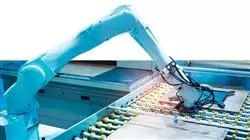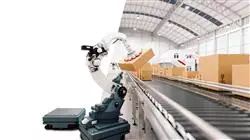University certificate
The world's largest faculty of information technology”
Introduction to the Program
Do you have a project in mind but lack expertise? In this program, an expert teaching team in Robotics gives you the tools to advance in Industry 4.0"

Robotics is part of our daily lives. Machines are not only present in the industrial sector, which has grown enormously thanks to technical and scientific advances, but Robotics has also been brought closer to the public. It is no longer rare to see how any person with any kind of qualifications can drive a drone, have virtual glasses to immerse themselves in the latest video game or see houses equipped with this technology that solves all kinds of problems.
Robotics is a common term, current and with a broad future for IT professionals who wish to specialize in an area with great growth possibilities. This Master's Degree provides extensive knowledge that will allow students to acquire learning in Augmented Reality, Artificial Intelligence, aerospace or industrial technology fields. All this will allow students to access companies in different sectors or create their own Robotics projects.
In this 100% online program, in order for students to achieve their goal, TECH has brought together a team of specialized professionals with extensive experience in prestigious international projects in the Robotics field. This teaching staff provides IT professionals with a theoretical-practical approach, where they will not only learn about the latest developments in Robotics, but will also be able to learn about its application in real environments.
An excellent opportunity to progress with a qualification that, from the very beginning, provides a complete syllabus composed of video summaries, essential readings, detailed videos and self-command exercises. This way, students will acquire a global vision of Robotics in a convenient way, as they will be able to access all the content whenever they wish and distribute the teaching load according to their personal needs. This will allow students to balance academic learning at the forefront of their field of study with their personal responsibilities.
Connect whenever you want, at any time to all the content of this university program. TECH adapts to you”
This Master's Degree in Robotics contains the most complete and up-to-date program on the market. The most important features include:
- Development of case studies presented by experts in robotic engineering
- The graphic, schematic, and practical contents with which they are created, provide scientific and practical information on the disciplines that are essential for professional practice
- Practical exercises where self-assessment can be used to improve learning
- Its special emphasis on innovative methodologies
- Theoretical lessons, questions to the expert, debate forums on controversial topics, and individual reflection assignments
- Content that is accessible from any fixed or portable device with an Internet connection
Enroll now and don't miss the opportunity to advance in the main visual SLAM technologies"
The program’s teaching staff includes professionals from the sector who contribute their work experience to this educational program, as well as renowned specialists from leading societies and prestigious universities.
The multimedia content, developed with the latest educational technology, will provide the professional with situated and contextual learning, i.e., a simulated environment that will provide immersive education programmed to learn in real situations.
This program is designed around Problem-Based Learning, whereby the professional must try to solve the different professional practice situations that arise during the academic year This will be done with the help of an innovative system of interactive videos made by renowned experts.
Develop clean and efficient PLC programming techniques with this university qualification"

Master the most advanced Robotics thanks to this program's approach on hardware and software agents"
Why study at TECH?
TECH is the world’s largest online university. With an impressive catalog of more than 14,000 university programs available in 11 languages, it is positioned as a leader in employability, with a 99% job placement rate. In addition, it relies on an enormous faculty of more than 6,000 professors of the highest international renown.

Study at the world's largest online university and guarantee your professional success. The future starts at TECH”
The world’s best online university according to FORBES
The prestigious Forbes magazine, specialized in business and finance, has highlighted TECH as “the world's best online university” This is what they have recently stated in an article in their digital edition in which they echo the success story of this institution, “thanks to the academic offer it provides, the selection of its teaching staff, and an innovative learning method aimed at educating the professionals of the future”
A revolutionary study method, a cutting-edge faculty and a practical focus: the key to TECH's success.
The most complete study plans on the university scene
TECH offers the most complete study plans on the university scene, with syllabuses that cover fundamental concepts and, at the same time, the main scientific advances in their specific scientific areas. In addition, these programs are continuously being updated to guarantee students the academic vanguard and the most in-demand professional skills. In this way, the university's qualifications provide its graduates with a significant advantage to propel their careers to success.
TECH offers the most comprehensive and intensive study plans on the current university scene.
A world-class teaching staff
TECH's teaching staff is made up of more than 6,000 professors with the highest international recognition. Professors, researchers and top executives of multinational companies, including Isaiah Covington, performance coach of the Boston Celtics; Magda Romanska, principal investigator at Harvard MetaLAB; Ignacio Wistumba, chairman of the department of translational molecular pathology at MD Anderson Cancer Center; and D.W. Pine, creative director of TIME magazine, among others.
Internationally renowned experts, specialized in different branches of Health, Technology, Communication and Business, form part of the TECH faculty.
A unique learning method
TECH is the first university to use Relearning in all its programs. It is the best online learning methodology, accredited with international teaching quality certifications, provided by prestigious educational agencies. In addition, this disruptive educational model is complemented with the “Case Method”, thereby setting up a unique online teaching strategy. Innovative teaching resources are also implemented, including detailed videos, infographics and interactive summaries.
TECH combines Relearning and the Case Method in all its university programs to guarantee excellent theoretical and practical learning, studying whenever and wherever you want.
The world's largest online university
TECH is the world’s largest online university. We are the largest educational institution, with the best and widest online educational catalog, one hundred percent online and covering the vast majority of areas of knowledge. We offer a large selection of our own degrees and accredited online undergraduate and postgraduate degrees. In total, more than 14,000 university degrees, in eleven different languages, make us the largest educational largest in the world.
TECH has the world's most extensive catalog of academic and official programs, available in more than 11 languages.
Google Premier Partner
The American technology giant has awarded TECH the Google Google Premier Partner badge. This award, which is only available to 3% of the world's companies, highlights the efficient, flexible and tailored experience that this university provides to students. The recognition as a Google Premier Partner not only accredits the maximum rigor, performance and investment in TECH's digital infrastructures, but also places this university as one of the world's leading technology companies.
Google has positioned TECH in the top 3% of the world's most important technology companies by awarding it its Google Premier Partner badge.
The official online university of the NBA
TECH is the official online university of the NBA. Thanks to our agreement with the biggest league in basketball, we offer our students exclusive university programs, as well as a wide variety of educational resources focused on the business of the league and other areas of the sports industry. Each program is made up of a uniquely designed syllabus and features exceptional guest hosts: professionals with a distinguished sports background who will offer their expertise on the most relevant topics.
TECH has been selected by the NBA, the world's top basketball league, as its official online university.
The top-rated university by its students
Students have positioned TECH as the world's top-rated university on the main review websites, with a highest rating of 4.9 out of 5, obtained from more than 1,000 reviews. These results consolidate TECH as the benchmark university institution at an international level, reflecting the excellence and positive impact of its educational model.” reflecting the excellence and positive impact of its educational model.”
TECH is the world’s top-rated university by its students.
Leaders in employability
TECH has managed to become the leading university in employability. 99% of its students obtain jobs in the academic field they have studied, within one year of completing any of the university's programs. A similar number achieve immediate career enhancement. All this thanks to a study methodology that bases its effectiveness on the acquisition of practical skills, which are absolutely necessary for professional development.
99% of TECH graduates find a job within a year of completing their studies.
Master's Degree in Robotics
Robotics is a branch of technology that deals with the design, construction, operation and use of robots. A robot is a programmable machine capable of performing complex tasks autonomously or semi-autonomously.
In robotics, sensors, actuators and control systems are used to enable robots to interact with the environment intelligently and perform specific tasks.
Robotics is applied in various fields, such as manufacturing, space exploration, medicine, agriculture, construction, among others. Robots are used to replace repetitive and dangerous tasks that are difficult for humans to perform.
A typical robot is composed of a mechanical body, a hardware and software control system, sensors and actuators. Sensors allow the robot to perceive its environment and gather information about it. The actuators allow the robot to perform actions in response to the information it receives from the sensors.
Programming is crucial in robotics, as it allows the robot to receive instructions from programmers to carry out specific tasks. Programming can be in specialized programming languages, such as robot programming language (RPL) or block programming language.
Expert robotics is a specialized field of study that combines technical and creative skills in mechanical engineering, electronics, computer science and programming to design, build and program customized and sophisticated robots. The field requires advanced knowledge in areas such as mechanics, electronics, artificial intelligence, machine learning and computer vision.
The Master's Degree in Robotics is a specialized program where students acquire advanced technical and practical knowledge in fields such as mechanical engineering, electronics, computer science and programming. The main objective is to design and create customized, sophisticated and functional robots and robotic systems for use in different applications, such as service robotics, medical robotics, military robotics, exploration robotics and collaborative robotics.







